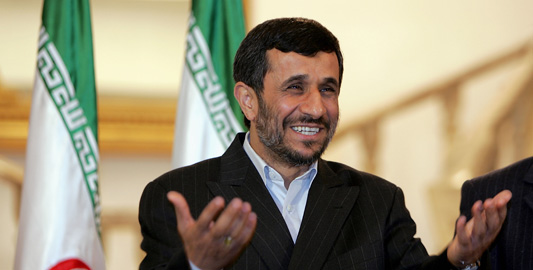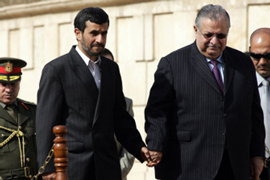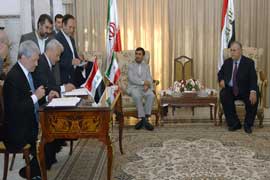Iran’s man in Iraq
Mahmoud Ahmadinejad’s visit to Baghdad highlights Iran’s growing power in Iraq.

 |
| Ahmadinejad said his “landmark” visit to Baghdad was aimed at improving relations between the once warring countries [GALLO/GETTY] |
When Mahmoud Ahmadinejad, the Iranian leader, visited Baghdad earlier this week, he became the first president from outside the US-led coalition to visit post-war Iraq.
During his visit, Tehran and Baghdad signed several agreements to promote economic, cultural and strategic ties between the two countries who were locked in bitter warfare during the 1980s.
But some Iraqi officials say the visit serves to emphasise Iran’s growing dominance in Iraqi affairs.
Dhafir al-Ani, an Iraqi MP for the Tawafuq (Accordance) Bloc, says Iran has been meddling in Iraqi politics by actively aiding some factions against others with the aim of securing influence in Baghdad.
“Iran must stop its support to some carefully selected Shia Iraqi factions, in order to guarantee they are stronger than those who oppose its influence in Iraq,” al-Ani told Al Jazeera.
“Ahmedinejad’s visit to Iraq is a strong message to the Iraqi people that Iran is present in Iraq.”
War scars
|
Iran has always called for US withdrawal from Iraq, and it will continue to do so but without jeopardising Iraq’s young political process. Kamil Wazne, |
Ahmadinejad’s visit was also packaged by the Iranian government as a means to overcome the scars of the 1980-1988 Iran-Iraq war in which hundreds of thousands were killed and wounded on both sides.
But overcoming the stigma of the bloody conflict may be a long time coming.
Iraqis say the war created a deeply-rooted rift with Iran who they accuse of still trying to promote its brand of revolutionary Shia Islam throughout Iraq.
In 1980, Iraq said it invaded Iran in a bid to thwart Iranian efforts to export the Islamic revolution to its neighbouring Arab countries.
At the time, Iranian clerics said they were fighting the secular government of Saddam Hussein, who they said was an infidel non-believer.
The memory of the war for Iraqis and Iranians is still profound.
When Ahmadinejad first addressed Iraqis in Baghdad he alluded to the “departure of the tyrant” in reference to Saddam Hussein, who was president during the conflict.
Post-war influence
 |
| Ahmadinejad is greeted by his Iraqi counterpart Jalal Talabani at his Baghdad residence [AFP] |
Since 2003 and the fall of the Saddam Hussein government, Iran has been cementing ties with successive Iraqi governments saying it was working for regional stability with its former foe.
But some quarters in the Iraqi parliament and security services say Iran is one of the key instigators of instability and violence in Iraq.
Mohamed al-Shahwani, the head of Iraqi intelligence, issued a statement ahead of Ahmadinejad’s visit accusing Iran of undermining the mostly Sunni Sahwa (Awakening) councils, which the US military has credited with helping to eliminate the al-Qaeda threat.
US officials also reiterated their belief earlier this week that Iran had been arming and training militias and death squads who have been blamed for much of the sectarian war in Iraq.
Ahmadinejad brushed off the accusations.
He said: “American officials talk too much. We do not care to hear their statements, because the Americans are giving statements based on false information.”
“We are going to give them some friendly advice. We believe that directing accusations at others does not solve American problems. They should solve their problems elsewhere,” he told the media in Baghdad.
Stronger than America?
Some Iraqis also believe that the US occupation of Iraq could not have lasted into its fifth year without Iran’s involvement.
In the immediate post-invasion political chaos, Iran was the first country to recognise the Iraqi Governing Council (IGC), which was established under the US occupation in 2003. US officials heralded the IGC as Iraq’s first multi-ethnic and liberal governing body.
Latif al-Seidi, a tribal leader from al-Diwaniya in the predominantly Shia province of Qadisiya in southern Iraq, believes Iranian approval of Iraqi governments backed by Washington was designed to facilitate the US occupation of an Arab Muslim country.
He told Al Jazeera: “His [Ahmedinejad’s] visit aims at consolidating the US occupation of Iraq, and to say that Iran is a major power in the region. His meeting with al-Maliki inside the US-protected Green Zone, is just another proof that the Iranian regime is not sincere when it declares America its enemy.”
“I believe, as many do, [that] the US and Iran media war is just a cover for this cooperation.”
Double standards?
Some Iraqis also question how Iranian-funded political parties and politicians have thrived in senior government posts under the protection of US political and military might.
Fadil al-Rubei, an Iraqi historian and political analyst, believes Ahmedinajad’s visit to Iraq sends “a message to the countries of the region to say that Iran is in Iraq and they should take that into consideration when dealing with both countries.”
Al-Rubei says Ahmadinejad is not looking for a confrontation with the US or any other power in the region.
“As a historian, I believe this is the reason why revolutionary Ahmedinejad, does not have a problem in visiting Iraq which is occupied by 150,000 US soldiers, and does not have a problem in entering the heavily guarded Green Zone, which is seen as the symbol of US occupation,” al-Rubei told Al Jazeera.
Despite Al Jazeera’s repeated requests for interviews, Iranian officials were unavailable for comment.
But Kamil Wazne, the director of the American Studies Center in Beirut, rejects accusations that Iran is facilitating US occupation or fuelling instability in Iraq.
He believes Iran is supporting Iraqis “until they are on their feet”.
He said: “We cannot say Iran has double standards because it supports the US-backed Iraqi government. Rather, Iran’s strategy is to give Iraqis enough time to be able to rule themselves properly after decades of suppressive rule under Saddam [Hussein].
“Iran has always called for US withdrawal from Iraq, and it will continue to do so, but without jeopardising Iraq’s young political process.”
Economic ties
 |
| The Iranian delegation signed economic deals with Baghdad during Ahmedinejad’s visit |
Part of Iran’s strategy of helping Iraqis help themselves comes in the form of economic initiatives and alliances.
Ahmedinejad’s visit to Iraq appeared to avoid discussing the security situation and focused more on the economic ties.
The trip concluded on Monday with the signing of several economic deals with Iraq.
Though Iranian goods started to appear in Iraqi markets before the US-led invasion in 2003, they now command the lion’s share of Iraq’s imports.
Muwafaq al-Rubei, Iraq’s national security advisor, says strengthening economic ties with Iran would ease regional tension.
Welcomed or not?
In Iraq’s south, where Iran’s influence is perhaps the most pronounced, there are mixed feelings regarding Ahmadinejad’s visit.
Some Iraqi Shia and Sunni tribes have welcomed the Iranian president’s visit, seeing it as a natural development in the ties between the two neighbours.
But in a move that is reflective of the deep divisions between southern Iraqi tribes, others have condemned Ahmedinejad’s visit to Iraq and demanded Iran to stop aiding “death squads” and interfering in Iraq’s domestic issues.
Demonstrators in several Iraqi cities took to the streets to express their frustration at Ahmedinejad’s visit, however, no demonstrations were seen in Shia areas.
Al-Seidi said: “I am from the south, where the Shia is majority, I assure you the discontent there is just as any other Iraqi region. The reason why we did not see people take to the street is because of the iron grip of Iranian intelligence and Iranian-paid militias.”
An Iraqi police officer serving in Basra, who chose not to be identified because he was not authorised to speak to the media, denied that protests had been planned in southern Iraq.
He said: “I have not learnt about protests in the south, however, I can tell that sympathy for Iran among Iraqis is not as strong as it was immediately after the US invasion in 2003.”